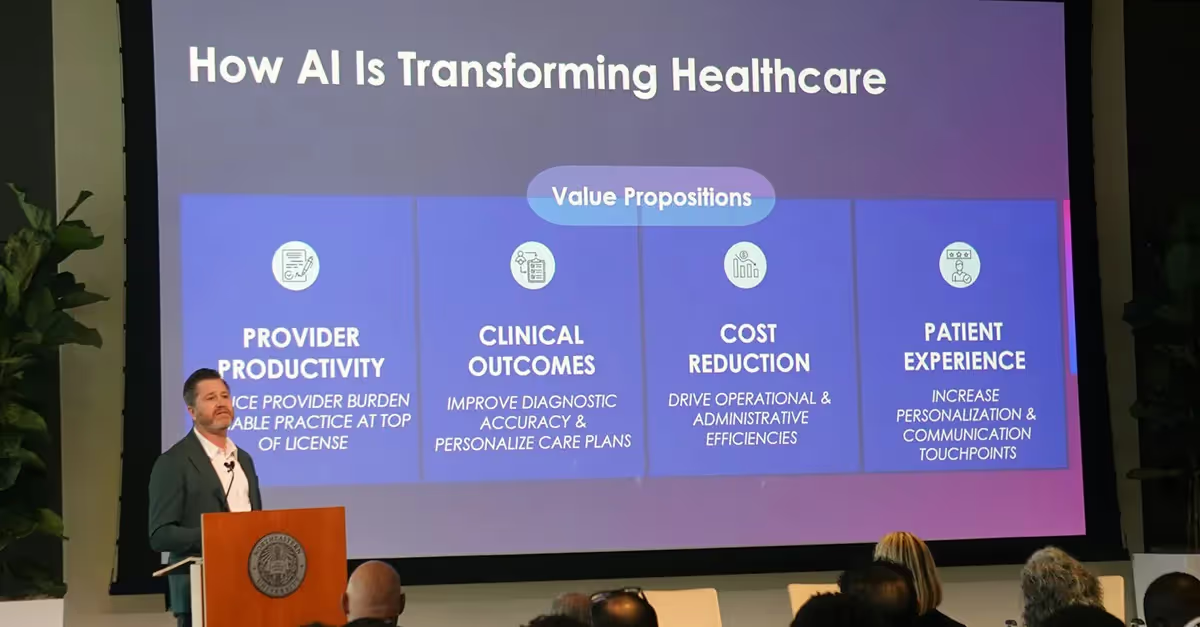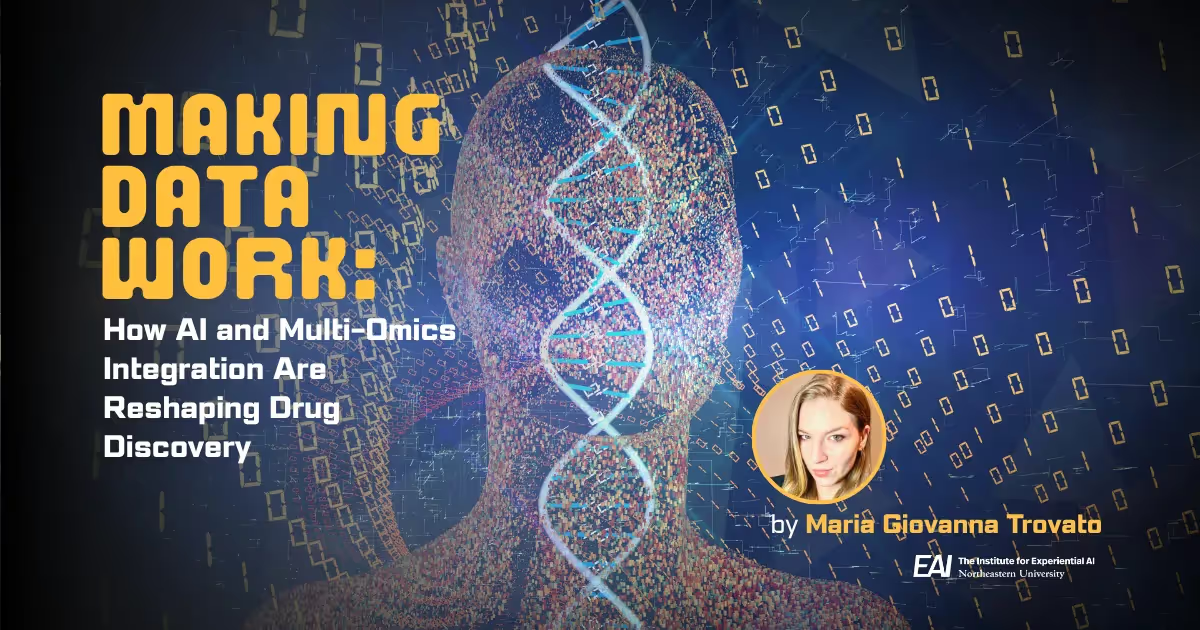How AI is Transforming Care and Operational Efficiency at Boston Children’s Hospital

As one of the world’s leading pediatric hospitals, Boston Children’s Hospital is constantly working to empower its workforce to deliver more compassionate, efficient care to patients. At the Institute for Experiential AI’s flagship The State of AI in Precision Health conference, Boston Children’s Hospital Chief Innovation Officer John Brownstein gave an inside look at how the organization is reimagining its patient care and operational workflows with AI.
Brownstein delivered his presentation to a packed audience on the 17th floor of Northeastern University’s East Village Oct. 10, emphasizing the essential but often overlooked aspects of implementing AI across a major healthcare institution — namely people, processes, and policies.
“We've been on this AI journey for over a decade now, and there's a lot of work that's happened in this organization well beyond generative AI,” Brownstein explained, noting he’s worked with Institute Director for AI + Life Sciences Sam Scarpino on disease surveillance among other projects. “We've been thinking about predictive and other machine learning models for a decade.”
.avif)
Under Brownstein’s leadership, Boston Children’s has developed a comprehensive AI strategy that balances innovation with practical utility, guard rails, and ethical use of the technology. To Brownstein, AI holds immense potential to address the most pressing challenges the healthcare industry faces today.
"There's an imperative right now in healthcare as the costs of taking care of patients is rising, labor costs are rising, and margins are down,” Brownstein said. “We are facing a crisis around supporting healthcare organizations in this country."
AI For Everyone
Last year, Boston Children’s Hospital became one of the first healthcare organizations to launch a hospital-wide, HIPAA-compliant GPT platform. About ten percent of employees immediately started using the tools. The hospital also provides API access to HIPAA-compliant GPT tools for its developers and has created a tool that lets employees build their own chatbots without writing a line of code.
"We're going department to department within our organization explaining how employees can effectively use these tools safely and securely in order to really engage the organization in broadscale adoption," Brownstein said.
But adopting technology isn’t enough. Brownstein's team recognized the need for specialized talent, leading them to hire what he called "unicorns" – including a prompt engineer with medical expertise.
"We focus on what we need to do to upskill an entire institution so they can takeadvantage of these tools and reduce the cost that we are spending taking care of our patients,” Brownstein said.
Boston Children’s implementation strategy operates on two tracks: enterprise-level initiatives for system-wide challenges and individual-level tools for specific clinical workflows. This dual approach ensures Boston Children’s leaders give clinicians the freedom to develop tools to the specific problems they face while maintaining necessary organizational oversight.
.avif)
Improving Care With AI
The hospital has made significant strides applying AI to clinical applications. They've implemented predictive modeling for emergency hospital admissions and integrated disease surveillance data for capacity planning purposes. During the recent "tripledemic" of RSV, COVID-19, and the flu, the hospital’s models accurately predicted bed availability for elective procedures.
Brownstein also believes AI can improve patient communication.
"For us, AI is not just about improving productivity," Brownstein said. "We're trying to improve the patient experience through new tools and new ways to continuously engage with patients."
Perhaps most importantly, Brownstein addressed the human factor in AI implementation. Rather than encountering resistance, they've found enthusiasm for tools that demonstrably improve workflow efficiency. The key has been starting with low-risk use cases and building trust through demonstrated value.
"We have to always be thinking about accountability and training, understanding that physicians aren't just replacing work with these tools," Brownstein says. "They have to support the clinician. AI isn't operating in a bubble."
Human-centered AI is a concept we advocate for strongly at the Institute for Experiential AI. Our term for AI with a human in the loop is “experiential AI.” Brownstein gave an example of that with an AI that drafts responses to patient messages in the hospital portal. The messages would always be reviewed by a human before they are actually sent to patients.
Looking ahead, Brownstein sees opportunities for expanding AI applications into areas like enhanced medical communication, discharge planning, and improved translation services. He says the focus should remain on practical implementations that deliver measurable value.
Delivering On the Promise of AI in Health Care
Brownstein’s presentation made clear that AI success in healthcare requires more than just cutting-edge technology. It also demands an intentional approach to organizational capacity building, careful attention to governance and equity, and a commitment to measuring outcomes.
"From a governance perspective, we've had to build a whole component within our strategy to think about the diversity within these projects and the teams that are utilizing these models," Brownstein said. "Algorithmic fairness and inclusion are also important to make sure that we're not only monitoring and understanding biases at the launch, but also doing that over time, because we know these models drift."
The Institute for Experiential AI’s Responsible AI practice helps organizations navigate ethical challenges presented by AI technologies by offering governance tools and metrics, algorithmic audits, and more.
.avif)
Our institute’s experts have extensive experience building technology solutions for the healthcare sector. We work with partners to find the highest-ROI opportunities to implement AI and build custom AI solutions based on each company’s unique needs.
Find out more about that work, and be sure to check out all the coverage from The State of AI in Precision Health conference!




